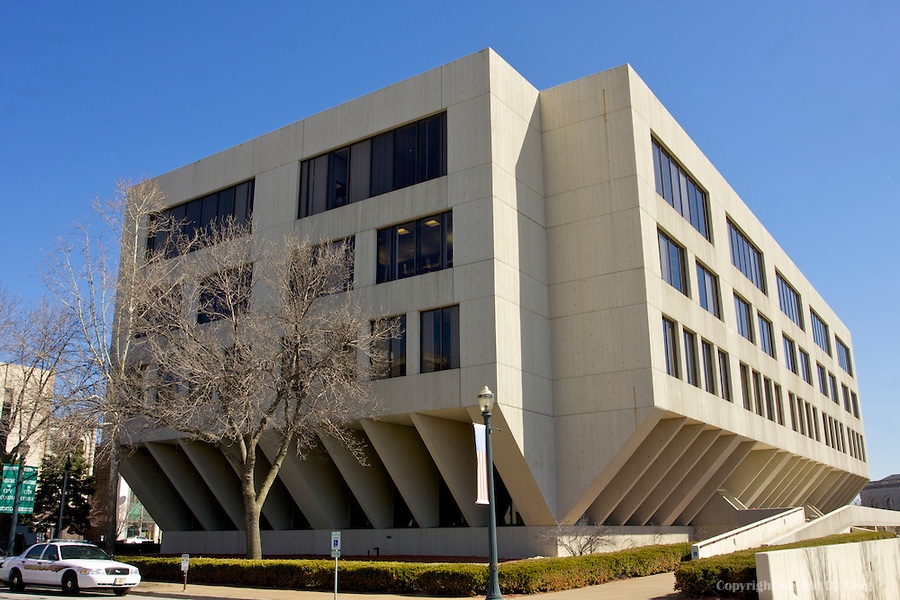Resolution to Rehab Former Courthouse Nixed

By Nick Reiher
Will County Board leaders struck a blow to proponents of rehabbing the former courthouse.
At their September 7 meeting, The board’s Executive Committee, composed of leadership and committee chairs, rejected a proposed non-binding resolution to have the county investigate reusing the former Will County Courthouse.
Despite the county moving ahead with plans for demolition this year, one of the newly elected members, Dan Butler, R-Frankfort, recommended the non-binding resolution. Following a special County Board meeting on the issue, it was referred to Executive Committee.
The non-binding resolution notes asbestos remediation has been done on the former courthouse, and that the previous, binding resolution approved by the board says adaptively reusing the former Will County Courthouse was “not in the best interests of the citizens of Will County, as such an endeavor would be difficult, costly and illogical, given the constraints imposed by inefficient floor plans, deteriorated building systems and estimated cost of building renovations versus estimated cost of new construction.”
Butler’s resolution also notes that new information has come to light in the nearly four years since the original resolution to demolish the building was passed. That includes learning new construction would be much more expensive than adapting the building for reuse.
County Board Member Julie Berkowicz, R-Naperville, believe those new members should be given a voice now.
But the issue comes back to an opinion by Assistant State’s Attorney Mary Tatroe. She has reiterated multiple times at a host of meetings that the original deed is held by the county in a public trust, and cannot be used for commercial endeavors, or even a public-private partnership.
Butler insisted the deed was for the land; not the building. So, the county could do as it liked with the building. But Tatroe rejected that, as well as the county being able to form a limited liability company that could seek tax credits for commercial redevelopment.
While there is nothing in state law that says the county could not form an LLC, Tatroe said the state has to give the county specific authority to do so.
It would take state legislation to change the trust, the State’s Attorney’s Office said, and any legislation change would affect all trusts in the state; not just this one.
Board Member Jackie Traynere, D-Bolingbrook, said she studied the laws regarding the county’s authority and found issues that she believed contradicted Tatroe’s opinion.
Board Chair Judy Ogalla, R-Monee, who oversees the Executive Committee, said the State’s Attorney’s Office, on whom they depend for their legal decisions, advised rehabbing for a public-private partnership or major commercial use was not possible because of the trust.
She said their architectural consultants advised them in 2019 that it would cost more than $40 million to rehab the building, but that it still wouldn’t be viable for reuse as new government offices in the future.
An architect hired by the grassroots courthouse preservation group told the committee at the September 7 meeting that he believed the structure could sustain two additional floors and various opportunities for moving walls as space was required.
He also said he made his recommendations from photos and models of the former courthouse, but he had not toured the inside personally.
While Butler and other proponents of rehabbing said it costs nothing to explore alternatives, several members of the committee reminded them the county – and its residents – are paying $8,000 to $10,000 a month for upkeep, not counting repairs to vandalism such as broken windows.
Traynere made a motion to amend Butler’s resolution, to make it binding and to call for the formation of an hoc committee to review proposals.
That motion failed, as did his original resolution, with 7 voting against and 4 supporting.
Responding to concerns about what would happen following a demolition, Board Member Meta Mueller, D-Aurora, said it was her understanding that it would become green space until the county was ready to develop it as a new office building, possibly sharing space with the City of Joliet.
The County Board voted in October 2019 to demolish the former courthouse, built in 1969, once the new $215 million courthouse to the west was ready.
COVID halted the demolition, which gave a grassroots group led by Joliet attorney Hudson Hollister time to gather support for saving the former courthouse.
They say the structure is an example of the Brutalist Design, popular from the 1950s to the ‘70s, which uses stark concrete, steel and glass treatments, such as with Marina Towers and the UIC complex in Chicago.
Dave Tkac, County Executive Jennifer Bertino-Tarrant’s Director of Facilities and Capital Programming, has said if all goes well, the bid for demolition, estimated at $1.3 million, could be awarded this year. Bids have been received, but a contract has not been awarded.
If not resolved this year, a new County Board may have to take it up again next year. Because all seats were up in 2022 following the census in 2020, some terms were staggered, meaning half the board will be up for election again next year.
